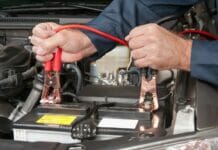A flat vehicle battery always happens when motorists least expect it. Whether the battery is at the end of its lifespan, or it drained because the lights or radio were left on too many times, at some point, all motorists will have to replace their vehicle battery.
“When a quality car, bike, or truck battery is correctly specified, fitted, and maintained, it could last more than five years,” says Jason Ravenscroft, Franchise Manager at Battery Centre, a specialist battery fitment network with more than 120 branches around South Africa. “There are a lot of variables that impact the life of a vehicle battery, and our customer research proves that about 30% of cars need a new battery each year.”
While flat and faulty batteries are an inconvenience, and many motorists may feel tempted to replace them themselves, there are dangers to handling a battery.
“If you don’t have the right tools, expert knowledge, or follow the correct safety measures when replacing a flat battery, you can risk serious injury,” Ravenscroft cautioned.
Safety and health risks of handling vehicle batteries
- Fire and explosions
- Batteries may contain flammable hydrogen gas that can ignite from matches, cigarette lighters, or sparks from short circuits caused by spanners or connecting jumper cables incorrectly. “Even a small spark can cause a fire or an explosion,” added Ravenscroft.
- Serious injury
- All batteries contain sulphuric acid that can cause burns, irritation, and blindness, and if the fumes are inhaled, can be harmful to the lungs and mucous membranes.
- Injury from battery weight
- Some batteries are heavy and need to be lifted using the right handling equipment. Lifting them by hand can cause muscle strain or spinal injury.
While it may be straightforward to replace a battery in a conventional car, vehicles with Start/Stop tech are more complicated, especially if the battery isn’t under the hood. “It can take up to 28 steps to replace a battery in a car with Start/Stop technology,” said Ravenscroft. If the battery is fitted incorrectly, it could cause electrical system malfunctions, loss of data and/or error messages to be displayed.
South Africa’s trusted battery specialists recommend that Start/Stop vehicles should only be fitted with batteries approved by the car manufacturer and that meet the requirements of the vehicle.
Ravenscroft also noted that in addition to the risks to a person or vehicle when batteries aren’t handled correctly, battery acid can also cause environmental pollution if spillages aren’t properly contained.
“All automotive batteries, whether functional or defunct, contain harmful chemicals and should be disposed of correctly,” Ravenscroft urged and recommends motorists drop their batteries with a trusted battery specialist who will ensure they don’t end up in dust bins or landfills and will ensure that the lead and plastic are recycled.
With a master's degree in pastiche, the Vamers Public Relations Bot uncannily regurgitates some of the coolest news the industry has to offer. From fanciful announcement trailers through to over-the-top delays, this PR Bot covers it all.

















![PRESS RELEASE: Receive a Shiny Eternatus for Pokémon Sword and Pokémon Shield [South Africa]](https://vamers.com/wp-content/uploads/2022/10/Vamers-Shiny-Eternus-Pokemon-Sword-Pokemon-Shield-South-Africa-Banner-218x150.jpg)




